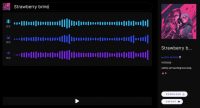Voice Cloning Startup CreateSafe Introduces GenAI Platform
November 22, 2023
Music tech studio CreateSafe has officially launched its generative AI-powered platform Triniti in open beta. Triniti lets artists create AI voice clones, generate text-to-audio samples, get assistance monetizing and managing music IP or interact with a chatbot on industry-specific music questions. The company has raised $4.6 million in a seed round led by cryptocurrency and blockchain investment firm Polychain Capital to further develop Triniti. Crush Ventures, hip hop music manager Anthony Saleh, and Paris Hilton’s 11:11 Media also participated in the funding round.
CreateSafe was co-founded by music manager Daouda Leonard after the company helped his client Grimes create her open source Elf.Tech AI voice software, which lets users replicate her voice on their tracks in exchange for splitting any ensuing royalties.

“Despite many musicians feeling threatened by AI, the Canadian electronic artist (and co-parent to children with Elon Musk who has just launched an AI company of his own) is doubling down on her stance regarding the use of AI music tools,” writes TechCrunch, heralding Grimes as an early mover and tech influencer.
TechCrunch calls Elf.Tech “the prototype of CreateSafe’s Triniti platform,” adding that “Elf.Tech has created more than 1,000 songs replicating Grimes’ voice” and adds that Grimes has joined CreateSafe’s advisory board.
Calling CreateSafe an “artistic intelligence platform” (in a play on the term “AI”), Leonard told TechCrunch “it’s not going to be fully AI because you have this interface to play around with and make the music on your own.”
“Triniti leverages a customized version of an RVC (Realistic Voice Cloning) model, as well as OpenAI’s ChatGPT for its virtual companion and Stable Diffusion to generate images for album covers,” TechCrunch reports, noting that the company is “also building a music model based on MusicGen that focuses on audio techniques like traditional DSP (Digital Sound Processing).”
The Triniti platform features “personalized AI tools,” including “an attribution engine, utilizing voice, sound, writing, and imagery inputs to generate all creative assets required for an artist’s campaign,” according to Music Business Worldwide, which explains that it “currently offers five accessible tools to the public: voice transformation and cloning; text-to-audio sample generation; AI chat; distribution; and managing music IP.”

No Comments Yet
You can be the first to comment!
Leave a comment
You must be logged in to post a comment.